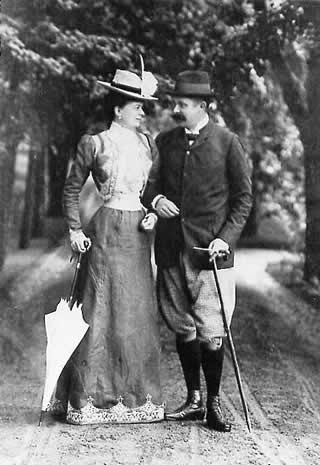They traveled separately from Vienna, she and her husband. They left the children at home.
She was looking forward to a few quiet days at a small resort town, one where she could escape for a while, however short, the constant slights and sideways glances that came - even after fourteen years of marriage - from the sharp-eyed Vienna ladies still trying to figure out how a little Czech countess had snared herself the Empire's greatest match. If her youthful prettiness was turning into a wary and diffident middle-age, in a place like Ilidza, she could for a little while shine nearly as brightly as a true archduchess.
The whole trip, of course, was really meant as something of a treat for her - not only the lovely days in the gardens of the Hotel Bosna, but then the day of ceremonies, once her husband joined her, where for once she would ride in the same carriage and take the same salutes as he. In Sarajevo, she would be a soldier's wife, and so of his rank no matter what the stiff protocol of the Hofburg said.
And so it played out. We all know the story, endlessly retold: the comedy of errors that took place in a deceptively serene small Balkan capital, the failed attempts on their lives and then the almost accidentally successful one. We all know her husband's last words: "Don't die! Stay alive for the children."
She could not. And the rest, quite literally, is history.
He called his marriage, from a worldly point of view so calamitous, "the cleverest thing I ever did in my life."
Forgotten, nearly, in the terror and chaos of the next four years, were the children. When at last the old emperor died, they of course had no place in the succession to what turned out to be a very temporary throne. One would have thought that one small consolation of their sidelining by accident of birth would be some level of distance from further accidents of history, but no. However quietly they lived - three handsome children, Sophie, Maximilian, and Ernest - they remained the orphans of Sarajevo, children, as a plaque in the imperial crypt declares their parents, of "the first victims of the World War." When another war swept across Europe, Hitler, as if spooked by the legacy of Sarajevo, ensured their suffering as victims of the second war as they had been, collaterally, of the first. The boys, now men, were sent to Dachau. They lived, but not long, and their sister spent the balance of her long life seeking to retrieve some of all they lost (everything from estates to the toys they'd played with as children, seized and scattered).
But on Saturday, the day before June 28, 1914, their parents spent a companionable day in a hotel garden. Things happen, and we can never know, exactly, what comes next. I'm glad they had that day.
Sophie Maria Josephine Albina, Countess Chotek of Chotkov and Wognin; HSH The Princess of Hohenberg; HH The Duchess of Hohenberg. Born March 1, 1868, in Stuttgart in the Kingdom of Wurttemburg; died June 28, 1914, in Sarajevo in Bosnia-Herzegovina, an annexed territory of the Empire of Austria-Hungary.



this was better written than any other such account I've ever read!
ReplyDeleteThank you. I think Sophie is an interesting person in her own right, and too often overlooked in the day's consequential goings-on...
DeleteExactly one hundred years older than I. She was only 45...
ReplyDelete